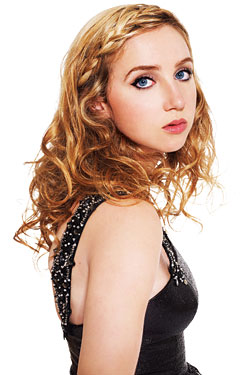 |
(Photo: Jiro Schneider/Corbis Outline) |
In the last five years, Zoe Kazan has drawn attention for her stage roles in The Seagull, A Behanding in Spokane, and Angels in America. Now, at 27, Elia Kazan’s granddaughter will have her first play produced in New York. On September 22, she’ll premiere the Manhattan Theater Club–commissioned We Live Here. She spoke with Jada Yuan during a momentary break on the set of He Loves Me—a film that she wrote and co-stars in with boyfriend Paul Dano.
Zoe Kazan: I am so sorry to do this to you, but can I call you back in seven minutes? I’m in line at the coffee place. [Seven minutes pass.] Now I have iced coffee. Everything is better. I was working from 5 p.m. yesterday until 7 a.m. this morning—we’re doing night shoots.
You’re having a busy couple of months.
Yeah, I’ve been on set and rewriting and then acting in the scenes and then when I get home at night, I’m rewriting the play.
At least having Paul on set must keep your relationship from falling apart …
Uh, yeah. I guess? [Laughs.] I’m joking. I mean, it’s incredibly stressful. On set, we’re happy and collaborative. But on the ride to the set we fight over stupid shit like whose turn it is to shower first.
Why did you start writing?
Because when I was first trying to get acting jobs, there would be these huge slots of time where I wouldn’t have work, where my only self-worth was coming from whether I got called back. So I was trying to make myself feel self-actualized, and that is the period of time that yielded my first play. Now it’s a huge part of my life—I know that I don’t have to take a shitty acting job anymore, because I have this other thing that I can do to fulfill any artistic impulses I have, and also make money. Which is shocking to me, but awesome.
You seem down on acting.
It’s just that actors are all lumped together as this vague mass of fame-hungry, swag-wearing, drug-using, eating-disordered people, and I sometimes get sick of being lumped with that group.
How do you feel looking back at your first play, Absalom, which was produced at the 2009 Humana Festival of New American Plays? You started writing that while you were still at Yale …
I still feel like that play needs a lot of work. It started off as a class assignment. I guess I had all of the hubris of youth, and now I have less of it. [Laughs.] I was reading all these big playwrights, like Chekhov and Eugene O’Neill and Arthur Miller, and I was like, “I’m gonna write a big, fat play.” You know? So I took on all these things that I really know nothing about, like fathers and sons and brothers. I don’t have brothers; I’m not a boy. And all of the characters were, like, 45 years old. I can’t read it now, but maybe in a few years I will.
No brothers in this one, then.
It centers on this relationship between two sisters who aren’t very close, and circles around this weekend before a wedding. All the things I’m writing are basically: How do you grow up? How do you overcome your past? How do you make yourself happy no matter what has happened to you? And hopefully it’s really funny.
You won’t be acting in it?
No—I will never act in a play I write. With plays, you spend all this time in rehearsal and previews—and then the actors have to go on for another month or two months. I can’t imagine that being fun, after the director has gone and you’re not allowed to rewrite anymore—that would make me crazy.
Your mother, Robin Swicord, is a screenwriter, as is your father, Nicholas Kazan. Have you asked them for advice on the play?
No. Mostly because—imagine your mother, like, giving you notes. I love my mom so much, but she’ll look at my shoes wrong and that’s a bad day for me.

